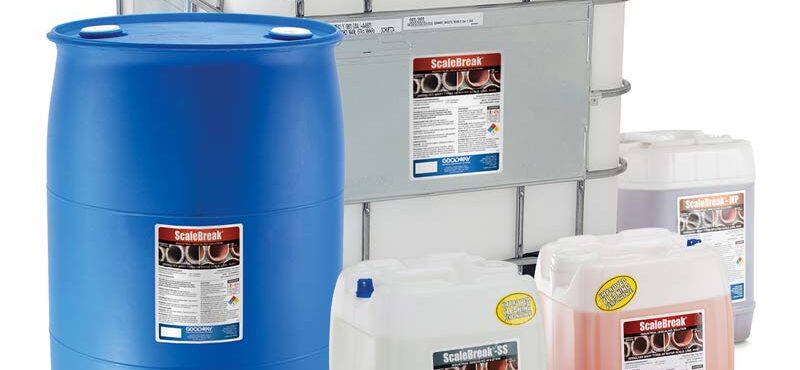Why All Chemical Descalers Aren’t the Same
Industrial descaling solutions are a quick and effective way to increase operating efficiency through the removal of water-formed deposits from tubes, pipes, pumps, and more. However, not all chemical descalers are created equal. Why? Simply put, two significant factors come into play.
- The various compositions of the deposits built up generally differ due to the water source and therefore need different acidic formulas for the best results.
- The underlying metal alloys in the equipment you are descaling differ, and some acids can cause dangerous levels of corrosion if not correctly matched.
Identifying the proper solution starts with a chemical descaler key ingredient, and it’s all about the acid used in the formula.
Why is the Base Acid Important in the Descaler?
The minerals in your water supply can range from a common calcium carbonate like limescale to more complex deposits such as iron oxides, phosphates, silicas, and many times a combination of all mentioned. Additionally, the metals within industrial equipment vary considerably. Your specific equipment may contain aluminum, brass, copper, carbon steel, stainless steel, or many others. The trick to proper scale removal is matching which base acid will effectively solubilize your mineral deposits (aka descale) without corroding your equipment. This choice is vital to getting the desired results and protecting your equipment from excessive corrosion.
While there are a few different comparable acids typically used, such as citric acid and phosphoric acid, many scale removers use hydrochloric acid as their primary active ingredient. However, it is not the correct base acid for every application. Why? Hydrochloric acid is incompatible with certain metals and can cause significant damage when used on them.
One typical example is using hydrochloric acid on stainless steel. When using hydrochloric acid to dissolve the calcium carbonate, chloride vapor is produced. This chloride vapor tends to create pockets of vapor within the equipment. This vapor attacks the stainless steel resulting in corrosion crevices, pitting, or even total failure.
That’s why choosing the correct solution compatible with your equipment alloys ensures an effective, safe cleaning without damage.
The only way to get the results you seek, and protect your vital systems from damage, is to select the right product for your descaling job based on your specific equipment, base alloys, and deposit composition.
NEXT STEPS:
We’ve identified various factors that should be considered when planning the descaling of your water-heated or cooled pumping systems. Since there is no true one size fits all solution when it comes to choosing the right chemical descaler, understanding these factors is the first step in identifying the correct solution. We understand this challenge, which is why we engineered the various formulas in our Goodway ScaleBreak® line of chemical descalers. Click here for more information about our ScaleBreak® chemical descaling solutions. We have also developed resources to guide you when choosing from our line of descaling solutions.
- Click here for help determining which ScaleBreak® descaler to choose
- Click here to help identify the proper amount of ScaleBreak to complete the job
You are not alone. Goodway Technologies offers free descaling consulting as it is our goal to make sure you utilize the correct descaling solution and cleaning methodologies so you can achieve a successful result. Whether you’re cleaning boiler tubes, chiller tubes, cooling towers, evaporative condensers, fluid coolers, heat exchangers or any other water-operated piece of equipment, we have the experience to help.


